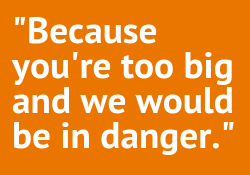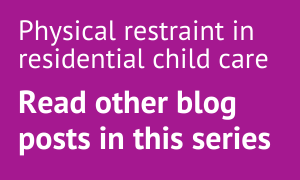Should our young people be experiencing physical restraint at any level?
David Grimm is a graphic facilitator, consultant, and a social work student. He is also a member of the Love work group and works as a 'Creative in Residence' for the Independent Care Review.

With Scotland currently undergoing a sector-wide review of care and promoting the idea of a loving environment and system for our young people, I ask:
Should our young people be experiencing physical restraint at any level?
Until recently my answer would have been that no person, let alone a child should ever experience physical restraint at the hands of an adult. Especially an adult in a paternal / guardian role of authority.
I am part of this group that has now got together to look at restraint, and I feel it is important to put forward my perspective in this debate, so I was delighted to be asked to contribute this blog post.
My reflections here are based upon my lived experiences, talking with friends, and recent discussions with professionals working in the care sector.
My lived experience of restraint
Throughout my time in residential care, I was never personally restrained. However, I witnessed friends being held to the ground and silenced in the name of 'personal safety' or the 'safety of others'.
At the time I believed this was okay - every young person in the residence thought this was normal, even if it wasn't a common occurrence. In hindsight, it was a rather unusual treatment that we just accepted as necessary. I can't explain why we thought this way, but we knew of other homes where this happened and the people enacting the holds, were – as far as I knew – paid, trusted members of staff who obviously knew better than us.
I believe the staff involved only used restraint in the most extreme circumstances, and only if they thought it was genuinely in our best interests, or necessary to keep us safe.
I once witnessed a 14-year-old girl, who trashed her room, worked up after her sibling contact had been cancelled as punishment for swearing, being restrained.
I heard and witnessed several causes for concern whilst in care, but this is one of my most vivid memories. Watching this was disturbing and caused me to question why I had never been 'pinned'?
Challenging Justification
I remember a few months after this incident that I found myself in the same situation, I was cheeky to staff which led to my sibling contact being cancelled, and me destroying my room. The noticeable difference was that police were called rather than any attempt being made to restrain me, and after minimal attempts to de-escalate my behaviour.
Police presence was another regular occurrence for us, but staff usually didn't call the police until all other routes were exhausted, including the usual last straw of restraint.
When I was told the police had been called, I slowly calmed down as I didn't want to add to my possible list of charges.
However, once the police had gone, I confronted staff and asked why it was that when others are angry you will restrain them, but with me you went straight to the police? And in the plainest voice, the reply was:
"Because you're too big and we would be in danger."
I remember feeling like the lowest version of myself because these people that I considered family(ish) had chosen to call the police rather than trying to hug me or treat me as equal to my peers by restraining me. The same staff who had once asked me to intervene and stop another young person from trying to stab them were now telling me they would rather criminalise me than try to hold me safe.
For weeks afterwards, I believed myself to be a real danger to those I lived with and that I was a criminal, worthy of police punishment. Also, that I was absolutely destined for jail.
At the risk of sounding dramatic, it took me almost 15 years to get over that sense of being a danger to others.
Listening to others
Over those last 15 years, I have discussed this at length with others who were restrained, and what sticks with me from those discussions is that three of these young people were thankful and loving to the staff for enacting the restraints. I asked one of them why they were thankful, and he said to me "it's better than being battered and jailed by the police mate".
I remember thinking how sad it is that he felt that way, but at the same time how restraint clearly needed to be used on a case-by-case basis, and could strangely be used to show a sense of love/caring to the young person involved.
This was the first time I was exposed to thinking about restraint in this way and I've since re-evaluated my opinions. Recently my assumptions were again challenged when I listened to a presentation from a colleague at the SIRCC Conference, in which a person explained that they felt they needed to be restrained.
I then read an article about restraint which included examples of young people who challenged staff for not restraining them. The author wrote of a girl who shouts in his face as she wasn't restrained when she felt she needed it.
The author also argues that "The physical act of close holding is what is required" in relation to smaller children, but I would argue that we need this for adolescents too if we ever hope to minimise levels of restraint in care.
I am now understanding that it's not necessarily carried out in malice.
We need to work together
I don't think restraint is an issue that we will fix alone, we must work as a collective power to figure out what is best, but I think it's important to discuss that for some young people, restraint may help, whereas for others it doesn't.
It's important that the sector is able to adapt and be flexible to meet the needs of the individual child or young person.
There is no 'one size fits all' approach.
I do look forward to the future for care and embracing a loving, nurturing and caring environment for young people.
Read other blog posts in the series
The views expressed in this blog post are those of the author/s and may not represent the views or opinions of CELCIS or our funders.
Commenting on the blog posts
Sharing comments and perspectives prompted by the posts on this blog are welcome. CELCIS operates a moderation process so your comment will not go live straight away.



